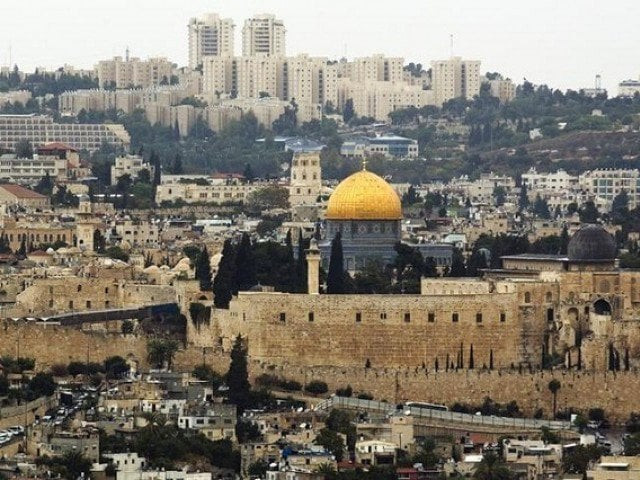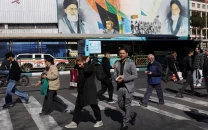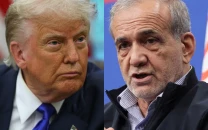Palestinians to end boycott of Jerusalem holy site
Compound includes the revered Al-Aqsa mosque, golden-topped Dome of the Rock

A general view of Jerusalem's old city shows the Dome of the Rock in the compound known to Muslims as Noble Sanctuary and to Jews as Temple Mount, October 25, 2015.PHOTO:Reuters
Muslim authorities announced that the boycott of the Haram al-Sharif compound, known to Jews as the Temple Mount, was to end on Thursday afternoon after Israel removed remaining new security measures.
The compound includes the revered Al-Aqsa mosque and the golden-topped Dome of the Rock. Palestinians had boycotted it since the security measures were installed following a July 14 attack nearby that killed two policemen.
Palestinian president, Mahmud Abbas, joined calls for worshippers to return to the site.
"The prayers will happen, God willing, inside the Al-Aqsa mosque," Abbas told a press conference.
Abbas announced a freeze on contacts with Israel last week over the dispute, including security coordination, and said on Thursday a meeting would be held on whether to lift it.
Standoff at Jerusalem holy site after metal detectors removed
Midday prayers were again held outside the compound, with officials saying preparations had to be made for worshippers to return to it for afternoon prayers at around 4:30 pm.
Before the midday prayer, there were celebrations with hundreds of people clapping and singing.
It became quiet later as the prayer time approached, with worshippers spreading out prayer mats on the ground.
A tense standoff had been underway between Israel and Muslim worshippers at the holy site for nearly two weeks despite the removal of metal detectors on Tuesday.
Newly installed railings and scaffolding where cameras were previously mounted were also removed early on Thursday.
Police said, on Thursday, morning that all new security measures had now been removed.
Muslims had refused to enter the compound and prayed in the streets outside after Israel installed the new security measures.
Palestinians viewed the move as Israel asserting further control.
Israeli authorities said the metal detectors were needed because the July 14 attackers smuggled guns into the compound and emerged from it to attack the officers.
Deadly unrest erupted in the days after the new measures were introduced, with clashes breaking out around the compound and in the occupied West Bank, leaving five Palestinians dead.
A Palestinian also broke into a home in a Jewish settlement in the West Bank last week and stabbed four Israelis, killing three of them.
There had been concerns that Friday's main weekly Muslim prayers -- which typically draw thousands to Al-Aqsa -- would lead to serious clashes between protesters and Israeli security forces if a resolution was not found.
In the pre-dawn hours of Thursday, crowds of Palestinians gathered at the entrance of the site to celebrate the removal of the remaining security installations, with whistling and constant horns from cars.
Israeli removal of holy site metal detectors not enough: Erdogan
Young men set off firecrackers as Israeli forces watched closely.
Firas Abasi said he felt like crying over the "victory".
"For 12 days no one has slept, no one has done anything except (think about) the Al-Aqsa mosque," he said.
Following intensive international diplomacy and warnings of the potential for wider unrest, Israel removed the metal detectors early on Tuesday.



















COMMENTS
Comments are moderated and generally will be posted if they are on-topic and not abusive.
For more information, please see our Comments FAQ